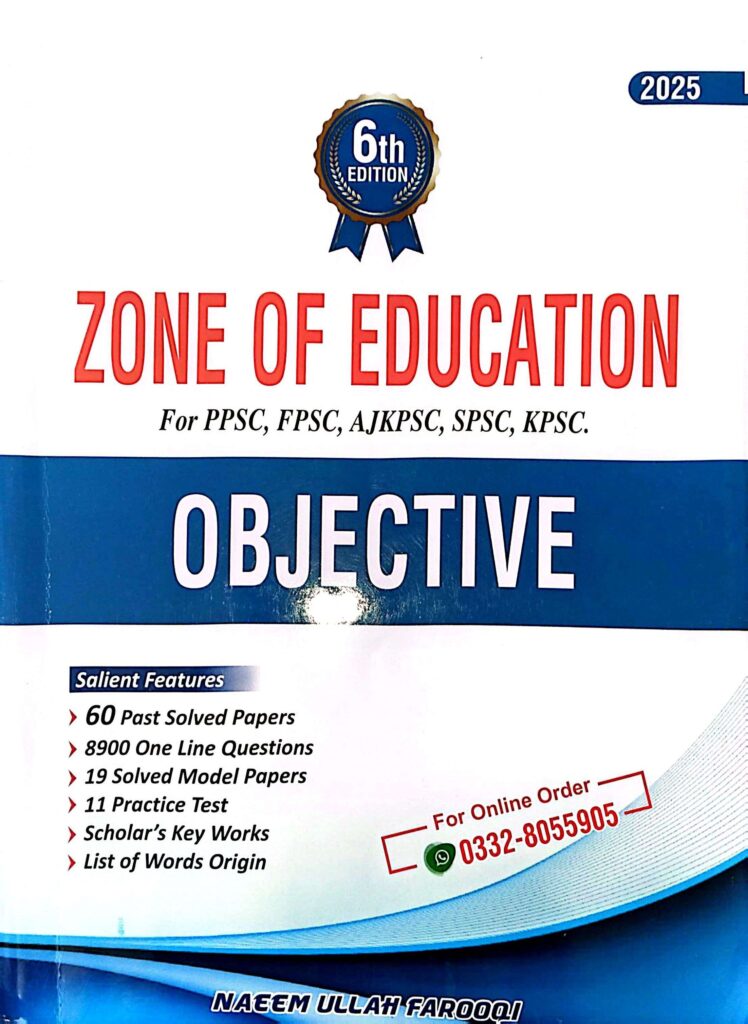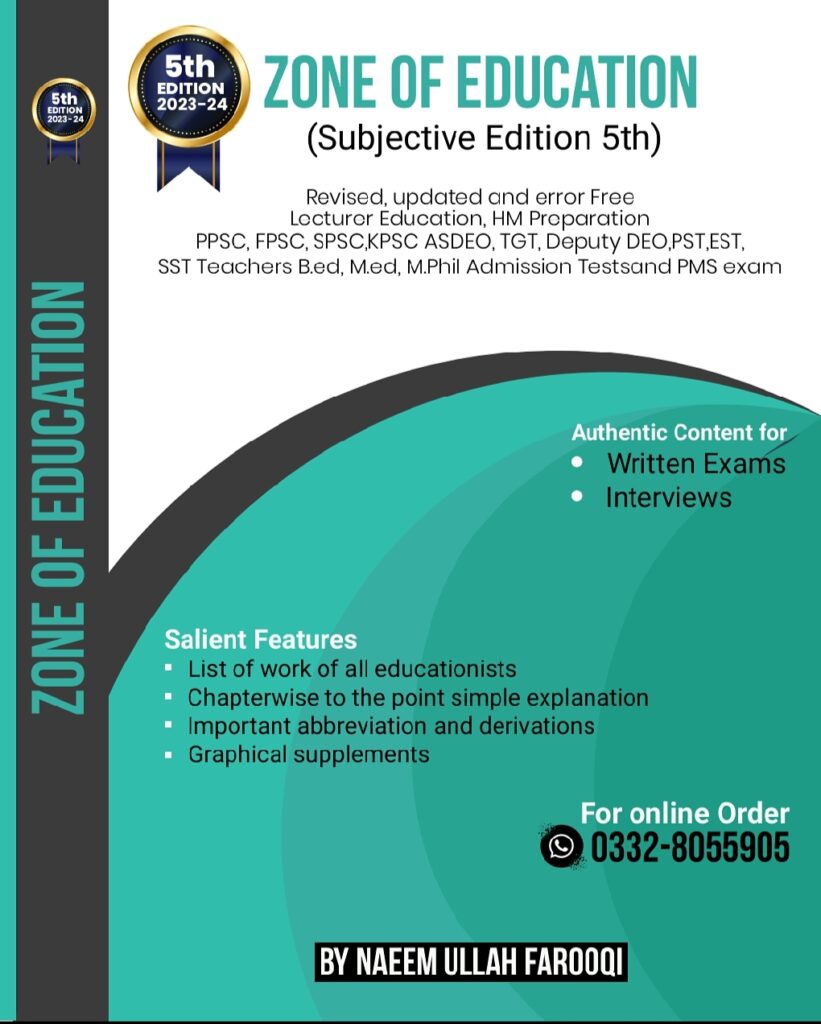History/Perspective 0f Education.
In Islamic education system the primary focal institution for universalization of education is:
(a) Home
(b) Mosque
(c) Community
(d) State
Answer: (b)
80. National educational policy 1979 put emphasis on:
(a) Nationalization of educational institutions
(b) Denationalization of educational institutions
(c) Private-public partnership of educational institutions
(d) None of above
Answer: (d
81. Urdu as medium of instruction is given importance in:
(a) All Pakistan Education Conference 1947
(b) Commission on National Education 1959
(c) New Education Policy 1970
(d) National Education Policy 1979
Answer: (b
82. EDO stands for:
(a) Executive District Officer
(b) Education District Officer
(c) District Education Officer
(d) Educational Development Officer
Answer: (a)
83. Most important quality of a good textbook is:
(a) Relation to course of study requirement
(b) Typography
(c) Appendices
(d) Index
Answer: (a)
84. The education system of a nation should be reflection of its:
(a) Philosophy
(b) Psychology
(c) Sociology
(d) Astrology
Answer: (a)
85. CRDC stands for:
(a) Curriculum Research and Development Officer
(b) Curriculum Research and Development Commission
(c) Curriculum Research and Development center
(d) Curriculum Research and Development Council
Answer: (c
![]() In Punjab CRDC was merged with Punjab curriculum and textbook board PCTB in October 2002
In Punjab CRDC was merged with Punjab curriculum and textbook board PCTB in October 2002
86. What was the basis of the Muslim claim to have a separate homeland?
(a) Customs and hair styles
(b) Clothes and customs
(c) Educational system and geographical curiosity
(d) Religion and culture
Answer: (d)
87. In Islam the base of superiority is on:
(a) Knowledge
(b) Purity
(c) Piety
(d) Wisdom
Answer: (c
88. In Islam man is:
(a) A social animal
(b) Physical being
(c) Khalifahtullah (vicegerent of God)
(d) Like other creatures
Answer: (c)
89. What entitled the Muslims to a separate nationhood?
(a) Geographical curiosity
(b) Customs and hair styles
(c) Education system
(d) Religious and cultural practices
Answer: (d)
90. What is the main ideal for nationalism?
(a) Collective self-determination
(b) The expression of national character
(c) The vertical division of the world into unique nations
(d) a, b & c
Answer: (a
91. Education in Islam is:
(a) Value Free
(b) Value full
(c) Neutral
(d) Partial development
Answer: (b)
92. Why the two societies (Hindus and Muslims) could not become one?
(a) Their outlook on life, their ways of thinking and their moral behaviors, with each other were quite poles apart
(b) Hindus were in majority
(c) The Hindus greet each other by Namastay
(d) The Muslims greet each other with Aslam-o-Alikum
Answer: (a)
93. The Educational-Philosopher who stressed more on the development of ego (Tameer-e-Khudi) is:
(a) Farabai
(b) Ibn Khaldoom
(c) Allama Iqbal
(d) Ibne Sina
Answer: (c)
94. Curriculum which is essential (Farz) at all levels of education in Islamic context is:
(a) Studies of Quran and Sunnah
(b) Physics and Chemistry
(c) Engineering and Technology
(d) Business Administration and Information Technology
Answer: (a)
95. The classification of Farz-e-Ain and Farz-e-Kifaya was presented by:
(a) Allama Iqbal
(b) Ibn Khaldun
(c) Imam Ghazali
(d) Shah Waliullah
Answer: (c
96. The political disintegration, economic decay, social and cultural down fall and moral and religious corruption produced an original thinker in 1703-1762, who was that person?
(a) Majaddid Alif Sani
(b) Ahmad Shah Abdali
(c) Aurangzeb Alamgir
(d) Shah Wali Ullah
Answer: (d)
97. The knowledge classification of Uloom-e-Naqlia and Uloom-e-Eqalia was presented by:
(a) Allama Iqbal
(b) Ibn Khaldun
(c) Sir Syed Ahmad Khan
(d) Imam Ghazali
Answer: (b
98. The most essential leadership quality in Islam is:
(a) Wealth
(b) Knowledge
(c) Inherited status
(d) Executive power
Answer: (b)
99. Perennial knowledge in Islam is derived from:
(a) Empiricism
(b) Revelation
(c) Induction
(d) Rationalism
Answer: (d
100. The values in Islamic education are, in general, rooted in:
(a) Open Culture
(b) Personal Desires
(c) Religion
(d) Will of the people
Answer: (c)
101. Muhammadan Oriental School and promoted to College in:
(a) 1875
(b) 1876
(c) 1877
(d) 1878
Answer: (c
102. The theory of “Self Realization” has been presented by:
(a) Sir Syed
(b) Ibn-e-Khaldun
(c) Allama Iqbal
(d) Shah Waliullah
Answer: (c)
103. Humility patience endurance and feelings of thankfulness can be classified as:
(a) Democratic Administration
(b) Authoritative administration
(c) Coercive administration
(d) Need-based administration
Answer: (a
04. What are different sources that the culture and society of Muslims and Hindus are sharply distinct from each other?
(a) Inspiration
(b) Intellectual culture
(c) Material life
(d) a, b & c
Answer: (d)
105. Name the nationalist Muslims who supported the congress?
(a) Maulana Muhammad Ali Johar & Abul Kalam Azad
(b) Shibli, Mahmood Hasan
(c) Hussain Ahmad Madni, Dr. Zakir Hussain
(d) a and c
Answer: (d
106. Why were Deo Band against Sir Syed Ahmad Khan?
(a) They disliked Sir Syed’s pro-English policy
(b) They never appreciated Western Education and culture being taught at Aligarh
(c) They were against Sir Syed’s rational progressive pragmatic approach in religion
(d) All a, b & c
Answer: (d)
107. When was All India Muslim League formed?
(a) 1906
(b) 1909
(c) 1912
(d) 1915
Answer: (a)
108. What did the Hindus call Dr. Iqbal, when he demanded a separate homeland for the Muslims of India in his address to All India Muslim League in 1930 at Allahabad?
(a) Visionary and idealist
(b) Visionary and Realistic
(c) Sadist poet
(d) Imaginative dreamer
Answer: (d
109. Why did the Muslims of India claim a separate homeland?
(a) Muslims ruled over India for a long time, they had distinct & superior spiritual and material strength
(b) Hindus were not prepared to grant any safeguard even to the language of the Muslims
(c) The orthodox Hindu organizations have created intolerable conditions from time to time
(d) a, b & c
Answer: (d)
JOIN ZONE OF EDUCATIONPK!
Discover the most comprehensive and reliable pedagogy resources in Pakistan, curated for competitive exam success. Our content covers all competitive exam MCQs, including PPSC, FPSC, AJKPSC, SPSC, and more. Designed to empower learners with top-notch material and insights, trust us for your preparation journey!


